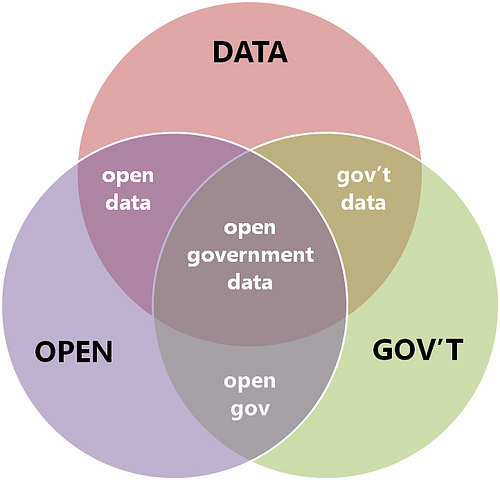"Open" is a Dialog, Not a Competition
 |
| Venn Diagram for Open Government / Open Data / Open Gov Data from Nik Garkusha Via Creative Commons |
So I am thinking what my remarks will be. I am thinking I would like to talk about how open data and anything "open" is really a dialog or a collaboration. How can a single PSA (Public Sector Agency) be open without collaboration with other PSAs? How can citizens drive "open" without government to provide the data? How can the government alone provide "open" and transparency without knowing what citizens want?
Most of what I read about in regards to open data is rarely written by people that actually work in government. I think that is significant and it speaks to my comments in the rest of this posting.
I have written quite a bit about the "culture of government". To be clear I am speaking about US models of governance. I have been in municipal government for some time and have worked as a consultant on county, state and federal levels.
Our government as a monolithic entity has never existed. The US "government" in particular is a collection of agencies and this model is copied down to the municipal level. Transformation and innovation is always balanced with accountability. Government serves the lowest common denominator. Everything from procurement to revenue collection to law enforcement and legislation has a process based on accountability to the citizens.
What I see locally is a government that is moving toward a service based model. This is something that is often referred to as "Government as a Platform". Getting there requires citizen collaboration with elected officials who then create resolutions and executive orders. Code for America is an excellent example of a civic group that works with government. These executive directives whether they be from a City Council or the President of the United States are interpreted by the workers within a given agency and carried out with accountability to the official(s).
Getting innovative means a dialog between government and citizens. Open Source, Open Data and Open Government are all examples of ways for government to innovate even though they are all separate types of innovation.
In regards to open data, how do we balance economic impact, being informative about government activities and till respect a citizen's privacy? These are questions I am working on by talking with citizens and members of the larger open data community.
"Open" does not happen with just civic activism alone. Public private partnerships involving citizen groups, innovative government leadership and innovative companies providing quality services and products are all needed.


Comments
Post a Comment